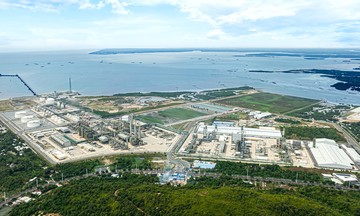US President Donald Trump signed an executive order on 31/5 imposing import tariffs on 66 economies. Switzerland faces one of the highest rates at 39%, lower only than Laos, Myanmar, and Syria. Meanwhile, the EU and the UK negotiated tariffs of 15% and 10%, respectively.
In April, Trump threatened 31% retaliatory tariffs on Swiss imports, but Swiss officials failed to reach an agreement with the US within the three-month postponement period. According to CNBC, the tariff news came as a shock, as the Swiss press had suggested an impending framework agreement with the US, with tariffs of only 10-15%.
President Karin Keller-Sutter expressed surprise at the 39% figure, as negotiators had discussions with the Trump administration last month, which appeared not to have been accepted. She said she would analyze the situation and try to find a solution. "I can't predict the outcome, but it will certainly harm the economy," she told reporters on 1/8.
The US goods trade deficit with Switzerland was 38.5 billion USD in 2024, a 56.9% increase from 2023, according to the Office of the US Trade Representative. Keller-Sutter suggested Trump chose the 39% tariff because it rounded up from the 38.5 billion USD goods trade deficit. "It is clear that the US president is focused solely on the trade deficit," she said.
The Swiss Federal Council expressed "deep regret" and added that it continues to seek a "negotiated solution" and is in contact with US authorities.
Adrian Prettejohn, a European economist at Capital Economics, predicted that the 39% tariff could reduce Switzerland's GDP by about 0.6%, or more if pharmaceuticals are included. Beat Wittmann, president of Porta Advisors, called the tariff "devastating" for the Swiss economy and businesses. "This will lead to a weakening of the Swiss economy, the Swiss franc, and the stock market, especially the all-important export sector," he said.
The US accounts for one-sixth of Switzerland's total exports. Key items include chemicals and pharmaceuticals, watches and jewelry, chocolate, gemstones, and electronics. Swissmem (Swiss Association of Mechanical and Electrical Engineering Industries) warned that the 39% tariff would have an "extremely serious" impact. The association's director, Stefan Brupbacher, was "stunned." "These tariffs have no rational basis and are completely arbitrary. This decision puts tens of thousands of jobs in the industry at risk," he said.
Switzerland is home to some of the world's most famous luxury and food brands. When the tariffs take effect on 7/8, the prices of Swiss watches, chocolate, and cheese could soar.
The 39% tariff angered the Federation of the Swiss Watch Industry. Since 2024, Switzerland has eliminated import duties on all industrial goods, thus not hindering US imports. "These tariffs are a serious problem for bilateral relations," the federation stated. June data showed that Swiss watch exports have been declining, especially to the US, Japan, and Hong Kong.
In the chocolate industry, multinationals such as Nestle and Lindt & Sprüngli have production lines in the US to serve local customers. However, small and medium-sized Swiss businesses are expected to be hit hard.
Roger Wehrli, managing director of Chocosuisse (Swiss Chocolate Manufacturers Association), said 7% of the country's output is exported to the US. Not only will the 39% tariff cause difficulties, but combined with the USD and Swiss franc exchange rate, costs could increase by nearly 50%. "I predict the industry will lose customers in the US and sales will fall sharply," he said.
Speaking on CNBC's "Squawk Box Europe," Rahul Sahgal, managing director of the Swiss-American Chamber of Commerce, called the tariffs "very disappointing" after many rounds of negotiations but hoped this was "not the end."
"We still have opportunities, first and foremost in the days leading up to 7/8. In addition, the executive order leaves the door open that if we are in the process of negotiating with the US, these additional tariffs may not be applied," he pointed out.
In agreements with the US, some economies have pledged to increase investment in the world's largest economy. For example, the EU has promised to spend a total of 600 billion USD, along with 250 billion USD on US energy purchases. With this solution, Sahgal said Switzerland is considering a commitment of about 150 billion USD in investment, one of the largest relative to the size of its economy. Switzerland is already the sixth largest investor in the US.
According to Sahgal, it is difficult to know exactly what the sticking points were in the negotiations or how Trump calculated the 39% tariff. Switzerland is in a difficult position to balance the total value of goods and services traded with the US, but Trump is focused only on the goods sector.
"Switzerland is a country of 9 million people, while the US has about 300 million. So even if every Swiss person drank a bottle of bourbon, ate a piece of US beef steak every day, and bought a Harley Davidson, we still couldn't balance our goods trade with the US," he said.
Phien An (according to AP, CNBC)












